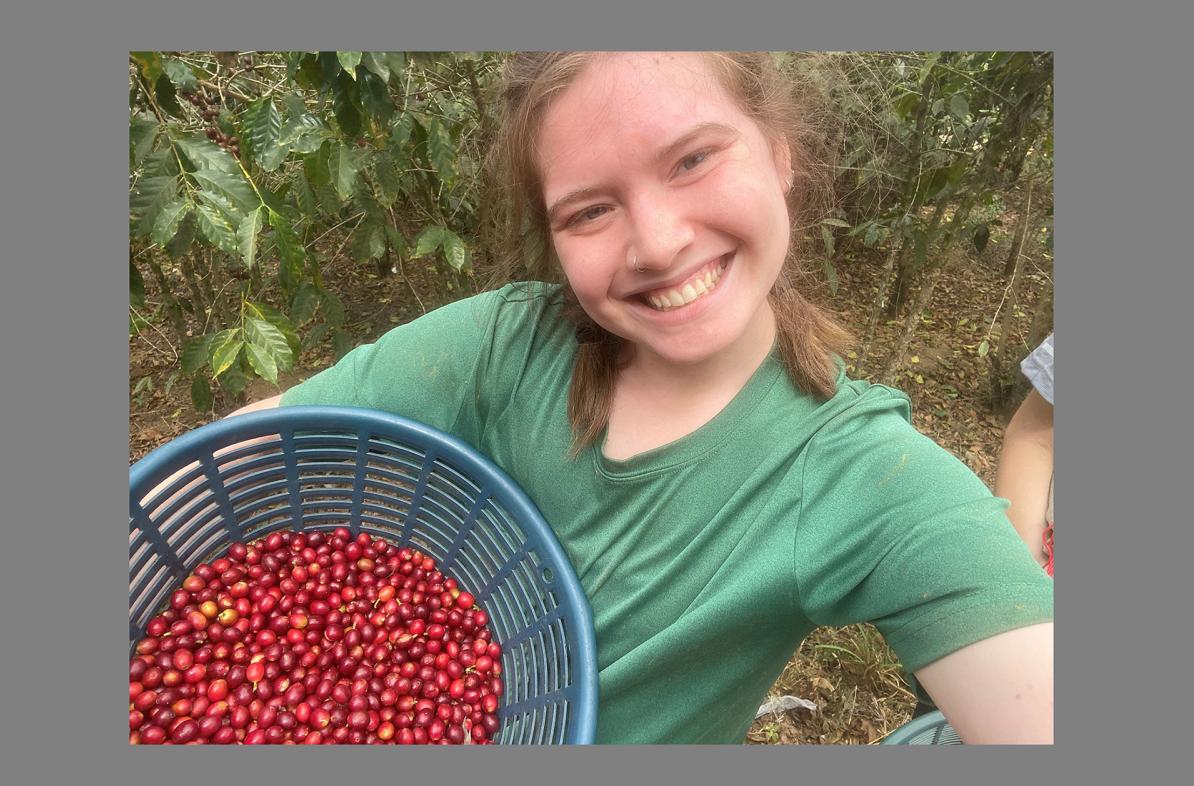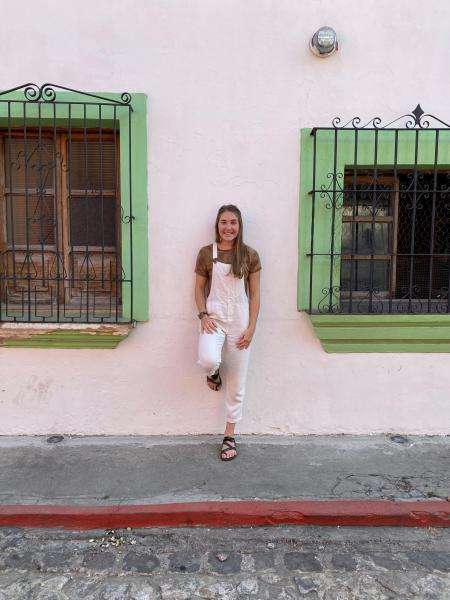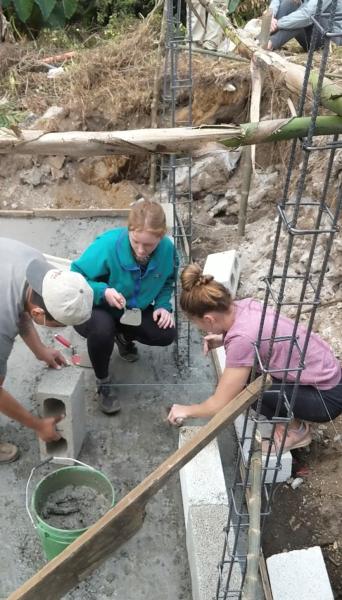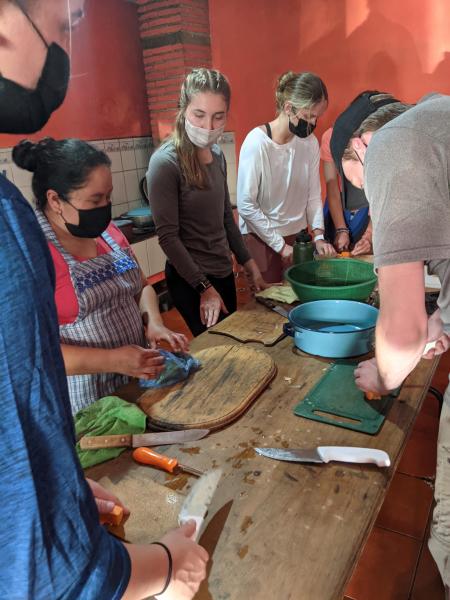
Guatemalan immersion program helps Blugolds build Spanish skills, cultural awareness
When Haley Blagdon and Emma Felty came to the University of Wisconsin-Eau Claire, they both already knew they wanted to explore new places and meet people who’ve had different life experiences.
So, an immersion program that takes students to Guatemala during Winterim was just the kind of opportunity they were hoping to find as Blugolds.

“I’ve always wanted to travel to different places to experience different cultures and ways of life,” says Blagdon, a neuroscience major and Spanish for Health Professions minor who is on the pre-physician assistant track. “It’s always been a passion and a goal of mine, so when Guatemala presented itself, I was all in.”
Blagdon and Felty were among the 15 Blugolds from various majors who were part of the 2022 “Guatemala: Social and Environmental Justice Winterim Immersion Program.” Alex Vaeth, an associate lecturer in languages, and Alison Millis, a business manager/analyst in Facilities, were the program leads.
Felty, a behavior analysis major and Spanish minor who also is pursuing a certificate in teaching English as a foreign language, was in a much-loved Latin American history class when she learned about the Guatemalan program. She jumped at the chance to learn even more about the region’s history by immersing herself in its culture and interacting with the people who live there.
“I wanted to hear about these histories from people who experienced it and who still feel these effects,” says Felty, a junior from Seymour. “I’ll fulfill most of my language requirements in Spain, but I wanted to experience culture in Latin America.”
During part of the immersion, students stay with families just outside of the historic Spanish colonial city of Antigua. The rest of the time, they are in San Lucas Toliman, where they complete a service-learning project with the local Indigenous community of Ij'atz.
The students say their experiences in Guatemala exceeded all expectations.
“This may be cheesy, but the whole trip was truly amazing,” Felty says. “I loved exploring cities in Guatemala, like Antigua and Guatemala City. It was really cool to see what life outside of the United States looks like. The scenery and nature in Guatemala are so beautiful.”
Blagdon, a sophomore from Waukesha, agrees, noting that every experience was meaningful.
“A few of my personal highlights include getting to see an active volcano, having Ronald as our guide because he was willing to share all of his knowledge about his country, and probably most meaningful to me, getting to build a connection with my host family through speaking only Spanish,” Blagdon says.
Experiencing new cultures

It was incredible to be immersed in a Spanish-speaking country while also learning about social and environmental justice, says Anna Green, a senior criminal justice and Spanish major from St. Paul, Minnesota. Like Blagdon, she says living with a host family was a highlight of her time in Guatemala.
“My host dad was a coffee farmer and very proud of his work, so we learned all about the coffee process, from harvesting the berries to where he ships his coffee in the USA,” Green says. “The whole family was very welcoming of us into their home and learning about each other’s lives.”
Interacting with Guatemalan coffee farmers, like Green’s host father, is an important part of the immersion program, says Dr. Jeff DeGrave, UW-Eau Claire’s intercultural immersions coordinator. The university’s on-site partner in Guatemala, De La Gente ("Of the People"), is a direct-trade/fair-trade coffee organization that aims to connect consumers in places like the U.S. with the actual producers of the coffee they consume.
“Students learn about the impact their and every person's purchases have on this local community when one chooses to buy coffee from a small, justice-focused, nonprofit organization like De La Gente or from a large U.S.-owned corporation,” says DeGrave, who traveled with the students to Guatemala.
Students talked with coffee farmers in the communities where they were staying, but also spent two days helping them in their fields. It was a powerful learning experience, Green says.
“I enhanced my worldview and knowledge, especially during our coffee workshops when we learned all the steps coffee goes through to get to the shelves in the grocery store,” Green says. “It opened my eyes to the impact our decisions have when we choose a brand or who we buy food or other products from.”
Green now also has a better understanding of how much the United States has influenced the history of other nations. That understanding of shared history is important if she wants to connect with people from other places in meaningful ways and make informed decisions about her own actions, she says.
“We can use this knowledge to teach others, make better informed decisions and make a positive impact on people locally and globally,” Green says.
The immersion in Guatemala also is changing how Blagdon thinks about the world and her place in it. For example, she says, she now is more aware of how the dollars she spends on material goods in the United States can impact people in other parts of the world.
“It gave me a more whole picture of the way the world works,” Blagdon says. “It made me more aware of my responsibilities as an American and how actions I don’t even think about can greatly impact others. I’m now conscious of the fact that every time I buy something materialistic, the money goes to an already well-off businessperson, or it helps the family of a small business buy groceries for the week.
“Overall, I learned how to be a more responsible citizen and to think about where my money is going when I purchase products.”

Felty also is thinking a bit differently about her daily life choices after seeing how Guatemalans prioritize their time.
“Life in Guatemala is a lot less complicated than life in the U.S.,” Felty says. “People don’t fill up their days and do things just to have things to do. They eat every meal with their families and spend hours talking about their day. Being submersed in this culture makes you slow down and appreciate life a little more. It’s helped me to slow myself down and make time for the people I care about. It showed me that it’s okay to take time to just drink coffee and catch up with people.”
Growing interest in immersive experiences
While COVID-19 has made it more difficult to plan immersive experiences for students, the ongoing pandemic seems to have made even more students more curious about other parts of the world, DeGrave says. Some programs were canceled because of COVID-related issues, but nearly 100 Blugolds did participate in 2022 Winterim immersion programs.
Some of the students’ curiosity about the world is likely related to wanting to understand how other countries and people are dealing with the ongoing pandemic, DeGrave says.
“If anything, the pandemic has illustrated an even greater need — and desire — to experience differing cultures, practices and ways of seeing and understanding the world,” DeGrave says. “In Guatemala, students did experience how the country and local folks are dealing with COVID. Guatemala's per capita COVID numbers are far, far lower than the U.S. Yet, we in the U.S. have access to the most advanced medical care, treatments and vaccinations.
“The program, like all immersion programs, provided firsthand experiential learning about how other folks solve problems differently than what we are used to here in the U.S., whether the situation relates to COVID, global warming, recycling and waste or something else.”
It also reminded students that the world is globally interconnected, so their choices have consequences beyond their own community or country, DeGrave says.
“They learned that our actions at home impact folks all over the world, whether that be the transmission of COVID, the economic impacts of buying direct-trade coffee, the burning of fossil fuels and the more apparent impacts of global warming elsewhere,” DeGrave says.
Challenges lead to new opportunities
The pandemic has created obstacles for students, faculty and staff who are interested in immersion programs, but it also has taught them to be more flexible and to recognize one’s privilege, DeGrave says.
Program leaders and most students committed in May 2021 to being part of the 2022 Winterim program in Guatemala, but it was early November before the university could confirm that the program could proceed, DeGrave says. They waited so they could make the most informed decision possible about what COVID levels might look like in January in Guatemala. So, neither the students nor the program leaders could make any plans during Winterim until the program's fate was determined.
COVID rules and policies also change constantly, requiring travelers to be flexible. For example, the U.S. State Department changed COVID testing rules on Dec. 8 to require that every U.S. traveler going abroad have a negative COVID test within one day of departing the U.S. and within one day of returning to the U.S. The U.S. made additional changes on Dec. 23 and then rescinded some of those policies on Dec. 24.
Since the program began on Jan. 4, DeGrave says students and program leaders had to act quickly to get COVID tests before leaving the U.S., while the Immersions Office had to make last-minute changes with De La Gente to arrange tests for them in Guatemala.
“It was quite obvious to everyone how much privilege we had all enjoyed while traveling prior to COVID,” DeGrave says. “We did not have to take COVID tests at home and abroad to fly, wear masks on flights, or stand in long lines to get COVID documents processed to board the plane.”
New safety measures also were in place for students in Guatemala, even though most activities did take place outdoors, DeGrave says. The university’s partner in Guatemala, De La Gente, led efforts to inoculate the Indigenous community where the service project took place. All homestay families had to be fully vaccinated to host UW-Eau Claire students. De La Gente also required that every student in the program be vaccinated.
“As we say about all immersion programs, ‘it's the students who make the program,’” DeGrave says. “And these students definitely made the program in Guatemala thanks to their patience, flexibility, cooperation, understanding, trust, resilience and perseverance. That’s what allowed the program to go forward and to give everyone a challenging, yet rewarding, transformative experience.”
Strong programs in and out of the classroom
The students say exceptional outside-the-classroom experiences — like the Guatemalan immersion program — coupled with UW-Eau Claire’s strong academic programs convinced them to be Blugolds.
“I chose Eau Claire because of its commitment to graduate well-rounded students,” Green says. “I’m proud that during my four years at UWEC, I have participated in the immersion program to Guatemala, studied abroad in Chile, participated in two CERCA events pertaining to my undergraduate research and completed an internship with the city of Eau Claire Housing Authority.”
Making time for all those experiences while also pursuing two majors was challenging, but well worth the effort because they’ve helped prepare her for future professional and personal success, Green says. For example, her time in Guatemala helped strengthen her intercultural communication skills and taught her how to adapt to changing circumstances, both skills that will help her in the future.
Green says she enjoys UW-Eau Claire’s criminal justice program because it allows her to study criminal justice but also related fields such as psychology, sociology and political science. Since Spanish is one of the fastest growing languages in the country, she’s confident her Spanish-language skills will be invaluable in her future career working in the criminal justice field.
When considering her college options, Blagdon was impressed by the many opportunities UW-Eau Claire offers students who are interested in health-related fields.
“It’s the only school I looked at that had a Health Career Center where students on a pre-health track can get specific advice and advising,” Blagdon says. “Since I knew I wanted to do something health related, this seemed like a big advantage to me.”
Coming into college, Blagdon planned to major in psychology. Then she discovered the neuroscience major, which she says aligns even more closely with her interests and career goals.
“I’ve always loved psychology and the way the brain and body connection works,” Blagdon says. “When I found out about the neuroscience major, I knew that was an even better choice for me. I still get to learn about some of the psychology aspects of the brain and body connection, but also learn about the anatomy of the body, which I will need in the future as a physician assistant.”
For Felty, it was a “no brainer” to make Spanish her minor since she’d already been studying it for several years. She was less sure about her major until she learned about UW-Eau Claire’s behavior analysis program.
“I was pleasantly surprised when I learned how great of a program it is and that it tied into my interests in both psychology and education,” Felty says.
You may also like


